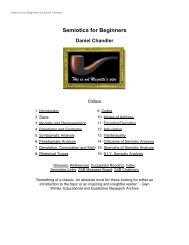Semiotics for Beginners by Daniel Chandler
Semiotics for Beginners by Daniel Chandler
Semiotics for Beginners by Daniel Chandler
Create successful ePaper yourself
Turn your PDF publications into a flip-book with our unique Google optimized e-Paper software.
<strong>Semiotics</strong> <strong>for</strong> <strong>Beginners</strong> <strong>by</strong> <strong>Daniel</strong> <strong>Chandler</strong><br />
• Preferred reading: This is a term which Stuart Hall originally used in relation to television news and current affairs<br />
programmes but which is often applied to other kinds of text. Readers of a text are guided towards a preferred<br />
reading and away from 'aberrant decoding' through the use of codes. A preferred reading is not necessarily the<br />
result of any conscious intention on the part of the producer(s) of a text. The term is often used as if it refers to a<br />
meaning which is in some way 'built into' the <strong>for</strong>m and/or content of the text - a notion which is in uneasy accord<br />
with a textual determinism which Hall rejected. Hall himself seemed to assume that (in relation to television news<br />
and current affairs programmes) such meanings were invariably encoded in the dominant code, but such a stance<br />
tends to reify the medium and to downplay conflicting tendencies within texts. Nor is it clear how we may establish<br />
what any such preferred meaning in a text might be. Does it constitute the most common reading <strong>by</strong> members of<br />
the audience? Even if it proves to be so, can it be said to reside 'within' the text? In the context of the polysemic<br />
nature of relatively open-ended texts, the notion of a preferred reading may be too limiting. The extent to which<br />
there may be a preferred reading is related in part to how open or closed the text is judged to be. See also:<br />
Dominant code, Ideal readers, Ideology, Intentional fallacy, Meaning, Overcoding, Overdetermination, Textual<br />
determinism, Univocality<br />
• Presence, metaphysics of: See Deconstruction<br />
• Primacy of the signifier: The argument that 'reality' or 'the world' is at least partly created <strong>by</strong> the language (and<br />
other media) we use insists on the primacy of the signifier - suggesting that the signified is shaped <strong>by</strong> the signifier<br />
rather than vice versa. Some theorists stress the materiality of the signifier. Others note that the same signifier<br />
can have different signifieds <strong>for</strong> different people or <strong>for</strong> the same person at different times. Lévi-Strauss<br />
emphasized the primacy of the signifier, initially as a strategy <strong>for</strong> structural analysis. Poststructuralist theorists<br />
such as Lacan, Barthes, Derrida, Foucault have developed this notion into a metaphysical presupposition of the<br />
priority of the signifier, but its roots can be found in Saussure and structuralism. See also: Arbitrariness,<br />
Constructivism, Conventionality, Idealism, Linguistic determinism, Materiality of the sign, Poststructuralism,<br />
Priorism, Relative autonomy<br />
• Priorism/foundationalism: Priorist or foundationalist theories grant ontological priority to certain 'foundational'<br />
entities which are regarded as 'givens' or first principles. Various theorists assign causal priority to God, material<br />
reality, perception, 'human nature', language, society, ideology, technology and so on, raising the problem of how<br />
we are to explain these entities and their origins. 'Commonsense' suggests that reality exists 'prior to' and 'outside'<br />
signification. In a naive realist <strong>for</strong>m, materialism posits a materiality prior to signification and attributes to it causal<br />
primacy. Essentialism grants an ontological status prior to and independent of language to certain key signifieds<br />
(which Derrida refers to as transcendental signifieds). Althusser declared that ideology was 'always-already given'<br />
(toujours-déjà-donné). Structuralism involved an attack on foundationalism, emphasizing that 'reality' is a<br />
construct and that there is no way in which we can stand outside language. However, both structuralists and<br />
poststructuralists thus give priority and determining power to language - which pre-exists all individuals. This is<br />
sometimes expressed as the primacy of the signifier. Social determinists reject the causal priority given to<br />
language <strong>by</strong> linguistic determinists and to technology <strong>by</strong> technological determinists. Derrida dismissed as<br />
'metaphysical' any conceptual hierarchy which is founded on an sacrosanct first principle and his deconstructive<br />
strategy was directed against such priorism. Some theorists would argue that whilst we may become more<br />
conscious of priorism it may nevertheless be as inescapable as 'which came first - the chicken or the egg?' See<br />
also: Deconstruction, Essentialism, Linguistic determinism, Ontology, Primacy of the signifier, Realism<br />
(objectivism), Reductionism, Relativism, epistemological, Structural determinism<br />
• Psychologism: See Reductionism<br />
A B C D E F G H I J K L M N O P Q R S T U V W X Y Z<br />
• Readers and writers, reading and writing texts: Whilst these terms appear to be graphocentric and logocentric,<br />
they are often used in semiotics to refer broadly to 'texts' and their users, regardless of medium. Writers and<br />
readers are sometimes referred to as encoders and decoders; a few commentators also use the terms makers<br />
and users in this broad sense (to avoid privileging a particular medium). Some semioticians refer to 'reading'<br />
(making sense of) visual media such as photographs, television and film: this is intended to emphasize the<br />
involvement of codes which are learned (largely <strong>by</strong> in<strong>for</strong>mal but regular exposure to the medium). See also: Text<br />
• Reading, dominant, negotiated and oppositional: See Dominant code, Negotiated code, Oppositional code




